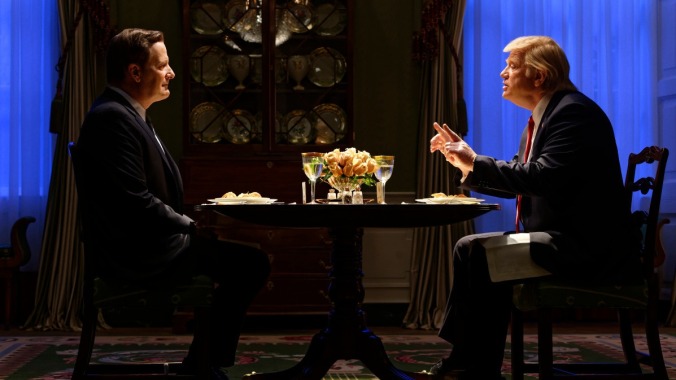The Comey Rule fuses Trump the cartoon with Trump the man, because there’s no difference


The Comey Rule’s central framing device only really works if you’re coming to this story with plenty of advance knowledge about the politics and character of Rod Rosenstein, former Deputy Attorney General under the Trump Administration. After an opening clip from Stephen Colbert musing about James Comey—“Is he a good guy or a bad guy?”—we’re placed in Rosenstein’s office in the Department Of Justice, where he’s telling an underling the story of Comey’s rise and fall in the public eye. Comey, the FBI director who Trump very publicly fired after he refused to halt the bureau’s investigation into Russian ties with Trump’s campaign, was, according to Rosenstein, “always a showboat.” We periodically check in on Rosenstein, as though he were the tell-it-like-it-is narrator of this limited series, like the grandfather in The Princess Bride. This is ironic if you know Rosenstein’s character (just a few days ago, it was revealed he reportedly instructed the Mueller investigation to limit the scope of its inquiry), but if you’re like most folks who can’t keep up with the revolving door of D.C. government officials, it appears that framing technique will give us an even-handed look at the story of James Comey (played by Jeff Daniels). It will not.
This is the problem with The Comey Rule: It disguises itself as a balanced look at the events surrounding Comey’s investigation into the Hillary Clinton email scandal, its possible role in the 2016 election of Donald Trump, and the subsequent fallout and eventual dismissal of Comey from his position, when it’s anything but. This story is directly taken from Comey’s memoir, A Higher Loyalty, which obviously presents the narrative with maximum sympathy toward poor James Comey. By the end of this two-part limited series, you half-expect the former public official to climb up on a cross and nail himself to it, smiling beatifically all the while.
There’s nothing wrong with that perspective as the basis for a work of historical fiction—every story needs a point of view, after all, and Comey had a hell of a front-row seat to one of the biggest clusterfucks in American political history. But by creating a framing device that supposedly looks back on the events with a dispassionate eye, only to pull the rug out from under the viewer by revealing Rosenstein (Scott McNairy) to be an unreliable narrator and just as craven as every other member of Trump’s coterie of sycophants, any suggestion that the film raises about Comey being anything but a true-blue American hero is thrown in the garbage. Writer-director Billy Ray adds material not in the book to create a supposedly fuller picture, but all of it ends up being in service of pure hagiography, the implication being that it’s okay if we’re only hearing this from Comey’s side, because he was right about everything, and we should consider placing his visage on a small mountain, possibly near Mount Rushmore.
Comey only comes across as recognizably human instead of a halo-encircled martyr thanks to Jeff Daniels’ humanistic portrayal. But while The Comey Rule fails as a critical and thought-provoking examination of its main character, it does work as an attention-grabbing spectacle of recent history. Broken into two distinct halves, the first installment briefly introduces the stalwart Republican, Comey, being appointed FBI Director by President Obama, before jumping ahead two years, to cover the year-plus duration of the Clinton email investigation, ending with Trump’s election. The second part delves into the immediate aftermath of the election, spending some time looking at the toll Comey’s actions have taken on his wife and two daughters (diehard Clinton supporters, all three) before getting to the main event: Comey’s meetings with Trump, including the infamous one-on-one dinner where Trump reportedly demanded Comey be loyal to him, rather than to the job.
It’s rough going at first. As it races to introduce a whole host of characters and motivations in the first half-hour, The Comey Rule struggles under the burden of trying to explain who all these people are, and what role they play in the proceedings. But once we get into the fraught nature of the Clinton investigation—and just as the team, including Comey’s new second-in-command, Andrew McCabe (a superb Michael Kelly), realizes they’re standing on a land mine of partisan undermining of the FBI—the story gets compelling. “You know you’re screwed, right?” one staffer tells Comey, and at its best, the limited series demonstrates the impossible position in which Comey found himself: An organization that has sworn never to do anything that could interfere with an American electoral outcome finds itself having to decide how to reveal information that, by definition, will do precisely that.
And all of that is before Brendan Gleeson’s Donald J. Trump makes his appearance, throwing open stage curtains like a Bond villain. The Comey Rule doesn’t hide its disgust at this narcissistic president, focusing on repellent close-ups when he’s preening at a news conference, or turning up the sound of his unpleasant snarfing down of ice cream during the notorious dinner with Comey. It feels gratuitous, like smearing fake blood on a serial killer already holding someone’s severed head in order to point out that they’re dangerous. There’s something inherently phony in any depiction of Trump; the man is such a sentient cartoon, it’s hard to see a portrayal of him that doesn’t immediately come across as a satire.
Gleeson does a better job than anyone has yet of finding a sort of horrific humanity inside the man. Wisely, he underplays Trump, making him more a weary solipsist than ranting buffoon, with a lived-in sense of lazy entitlement that feels honest and unsettlingly true. It takes a while to get past the strange not-quite-resemblance of the two men, but after the initial weirdness of it wears off, Gleeson’s performance starts to feel downright revelatory, as though he uncovered the Rosetta Stone to Trump’s soul, or lack thereof.
Gleeson’s bitter monologuing is matched only by Daniels’ almost wholly reactive performance, Comey becoming a kind of universal stand-in for every rational adult who thought they could reason with Donald Trump without being swallowed up by the vainglorious reality-TV host’s boundless need and egoism. Knowing that so much of what we’re watching is quite literally on the record makes the Curb Your Enthusiasm levels of discomfort that much more pronounced—this guy really exists, and he’s really like this. The most plausible part of the stranger-than-fiction venality of the Trump administration is watching Comey, ever so briefly, fall down the rabbit hole of plastered-on smiles and obsequiousness demanded by his new boss.
The Comey Rule may not be a great event series, but it’s a damned compelling one, with a real-life tale that still beggars belief and a fantastic group of actors to tell it. It makes the case that maybe Karl Marx was a little too quick to hold his ideas at arms’ length: History doesn’t repeat itself first as tragedy, and then as farce. It’s a farce through and through, and the tragedy just keeps on coming.